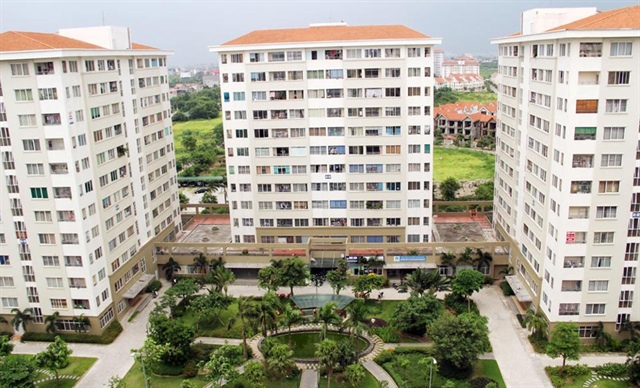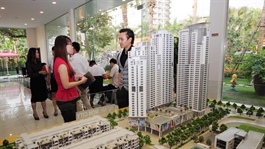Vietnam's construction ministry plans to build 1 million social houses by 2030
Vietnam's construction ministry plans to build 1 million social houses by 2030
New social housing projects would be concentrated in localities with major industrial parks, or large urban cities, such as Hanoi, and Ho Chi Minh City.
Vietnam is expected to build at least one million social housing units from now on until 2030, focusing on major cities such as Hanoi, Ho Chi Minh City, Bac Giang, and Long An.

A social housing project in the Dang Xa residential area. Photo: Pham Hung |
The Ministry of Construction (MoC) revealed the target in a proposal on promoting social housing projects for low-income groups and workers in industrial parks in the 2021-2030 period.
A survey conducted by the MoC in 40 provinces/cities estimated total demand for social housing from low-income people and workers in the next ten years would be around 2.6 million units.
Local authorities have also mapped out plans to build 1.8 million housing units by 2030, meeting 70% of the actual demand.
However, in this latest proposal, the MoC suggested around one million houses would be built by 2030, lower than the expectation from localities.
Bui Xuan Dung, director of the Ministry of Construction’s Housing and Real Estate Market Management Agency, said such a number would be more feasible, referring to the fact that several provinces/cities have not allocated land or proceeded with investment procedures for their proposed projects.
According to the MoC, the majority of social housing projects would be executied in localities with major industrial parks, including Long An (310,000 apartments), Bac Giang (285,000), Bac Ninh (96,247), and Binh Duong (84,000).
Social housing projects are also seen as a priority in large urban cities, such as Hanoi (136,000 apartments), Ho Chi Minh City (130,000), Haiphong (45,355), and Danang (19,360).
The MoC expected the plan to be implemented in phases, in which around 700,000 apartments should be built in the 2021-2025 period, or 54% of the total demand, and 1.1 million in 2025-2030, or 85%.
Minister of Construction Nguyen Thanh Nghi has acknowledged difficulties in promoting the construction of social housing, mainly due to complicated investment procedures compared to commercial projects.
In addition, the calculation of sales prices or rental rates for social housing units built with private capital is carried out by authorities at the provincial level, which is time consuming for investors.
To realize the goal of having at least one million social housing units by 2030, the MoC stressed it would continue to simplify administrative procedures and revise policies toward post-review for all processes, from selling price determination to the qualification of buyers.
Regarding the shortage of land, the MoC noted it would work with provinces/cities to adjust their respective planning for the allocation of additional land for social housing projects.
“All localities are required to set aside at least 20% of the area of property development projects for the construction of social houses,” it added.
The MoC also called for the revision of the Law of Housing, Land Law, Bidding Law, and the Law on Tax Administration so that low-income and socially vulnerable groups would have a better chance of purchasing social housing.
“Leaders of each province/city should consider the construction of social housing their political mission,” stated the ministry.
At present, Vietnam has completed 301 social housing projects in urban areas and industrial parks with a total of 155,800 apartments, while 401 others with 454,360 housing units are under construction.
|
Hanoi is working on the construction of five social housing projects, of which, two are at Tien Duong Commune, Dong Anh District, and three at Co Bi Commune (Gia Lam District), Ngoc Hoi Commune (Thanh Tri District), and Dai Mach Commune (Dong Anh District) Hanoi’s authorities is aimed at building at least two social housing projects during the 2021-2030 period, and complete the preparation process for the remaining three. In the 2016-2020 period, Hanoi built 34.8 million square meters of housing, surpassing the five-year target of 31.5 million square meters. Under Hanoi’s housing development program for the 2021-2030 period, the city aims to build another 44 million square meters of floors between 2021 and 2025, including 1.25 million square meters of social housing, 560,000 square meters of resettlement houses, 19.69 million square meters of commercial houses, and 22.5 million square meters of detached houses. |


























